7 B2B Tech Lead Generation Strategies That Will Actually Work in 2025
GROWTH
5/1/20257 min read
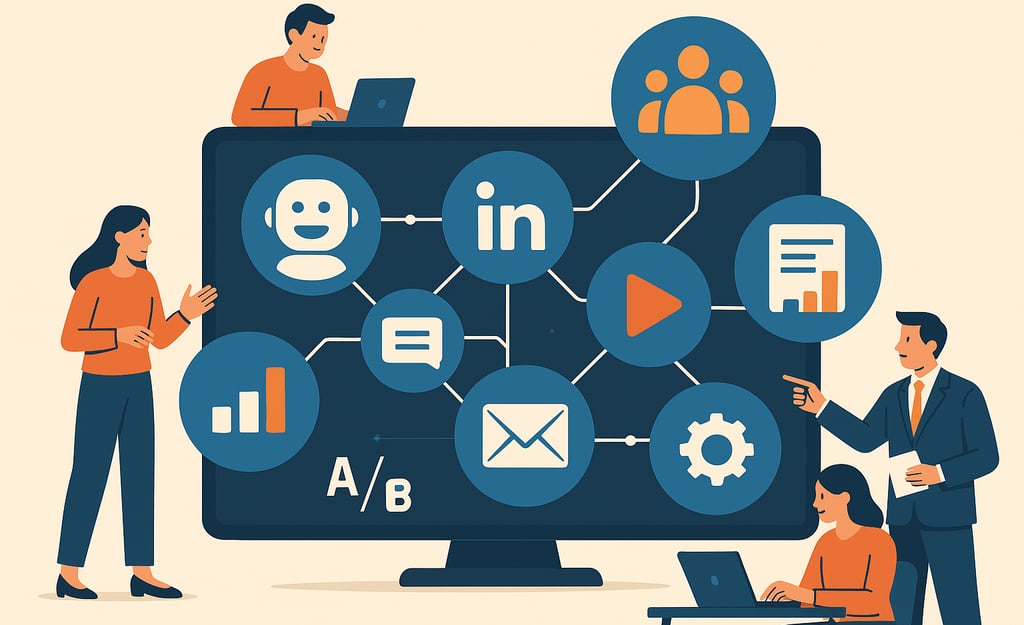

The days of generic outreach and hoping for results are long gone. B2B tech buyers are bombarded with marketing messages and have developed serious filters against anything that feels like a standard pitch.
What separates companies that consistently generate quality leads from those that struggle? At BriskFab, we've spent years analyzing what actually works in the B2B tech space, and the data is clear: success comes from a strategic approach that combines cutting-edge technology with fundamentally human connections.
Let's dive into the seven strategies that are delivering real results in 2025.
Understanding Today's B2B Tech Buyer
Before we get to the strategies, let's acknowledge what we're up against:
B2B buyers complete nearly 70% of their journey before ever talking to sales
Multiple stakeholders (often 6-10 people) influence purchase decisions
Decision-makers expect personalized interactions at every touchpoint
This new landscape requires a more sophisticated approach to lead generation. Here's what's working.
1. AI-Powered Lead Generation That Actually Works
AI has evolved from an overhyped buzzword to an essential tool. The companies seeing the best results are using AI in two key areas:
Intelligent Chatbots & Predictive Analytics
Modern AI chatbots can engage website visitors in meaningful conversations, qualify leads in real time, and gather behavioral data that reveals true buying intent.
The key difference between companies doing this well and those failing: the quality of implementation. Effective chatbots:
Ask questions that align with your qualification criteria
Provide genuinely helpful information (not just try to capture contact details)
Know when to seamlessly hand off to human team members
Meanwhile, predictive analytics helps you sift through vast amounts of data to identify which prospects are most likely to convert. This isn't just about lead scoring, it's about understanding buying patterns and behaviors that indicate readiness to purchase.
Automated Personalized Outreach
AI is also transforming outreach by enabling personalization at scale. This goes beyond simply inserting a first name into an email.
Companies seeing the best results use AI to:
Create custom email sequences based on prospect behavior and interests
Adjust messaging based on engagement metrics
Time outreach to match prospect activity patterns
One tech company we worked with saw conversion rates increase by 34% after implementing AI-driven personalization in their outreach campaigns. The technology identified patterns in how different buyer personas engaged with the content and automatically adjusted follow-up timing and messaging accordingly.
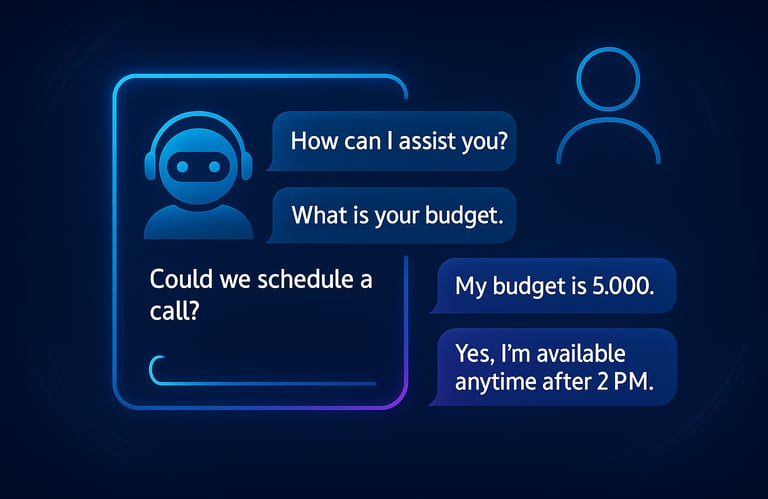

2. Beyond the Basics - Social Media Mastery
In 2025, LinkedIn is the go-to platform for B2B tech lead generation, but success lies in organic, budget-friendly tactics. Forget pricey tools, focus on social listening and founder-led content to connect with decision-makers authentically. Here’s how to make it work.
Social Listening with LinkedIn’s Free Tools
Use LinkedIn’s free search to track conversations and trends:
Search keywords like “#EnterpriseSoftware” or “#DigitalTransformation” to spot buyer pain points.
Filter for posts from key roles (e.g., IT directors).
Comment on your company page to build visibility.
Check competitor insights to refine your approach.
Example: A spike in “data compliance” chatter? Create targeted content. LinkedIn’s 2025 B2B Marketing Report says 78% of marketers using social listening better understand buyer intent.
Founder-Led Content for Trust
Get your founder or execs posting:
Share actionable insights (e.g., “Why SaaS Integration Matters”).
Engage in comments and LinkedIn Live Q&As. Oktopost reports 75% of B2B buyers favor authentic, expert-driven content. One CEO’s monthly posts boosted lead engagement by 45%.
Action Plan
Spend 15 minutes weekly on LinkedIn searches.
Have execs post weekly with a simple template.
Track engagement with LinkedIn’s free analytics.
Social listening keeps you relevant, founder-led content builds trust, and organic tactics maximize reach your B2B lead engine for 2025.
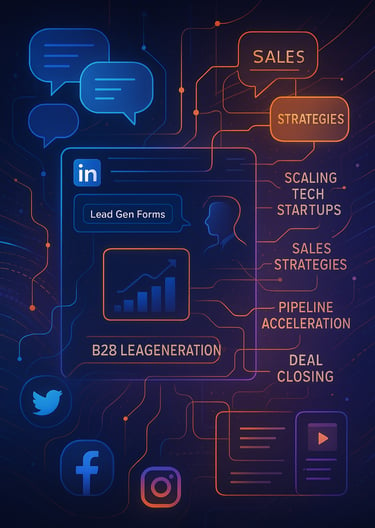

3. Account-Based Marketing (ABM) That Gets Results
ABM has evolved from a buzzword to an essential strategy for many B2B tech companies. The core principle, focusing resources on specific high-value accounts, works when executed properly.
Precision Targeting
Effective ABM requires:
Developing a selective list of target accounts based on fit, need, and potential value
Creating campaigns that speak directly to the specific challenges those organizations face
Coordinating outreach across multiple channels and touchpoints
One B2B SaaS client we worked with narrowed their target account list from 500 to just 50 high-intent companies. This shift enabled hyper-personalized outreach, tripling their conversion rate and reducing customer acquisition costs by 40%.
Sales and Marketing Integration
ABM fails when sales and marketing operate in silos. Success requires:
Unified messaging across all touchpoints
Clear handoff processes between teams
Shared metrics and goals
The companies seeing the best results have eliminated the traditional boundary between sales and marketing, creating revenue teams that work together throughout the entire customer journey.
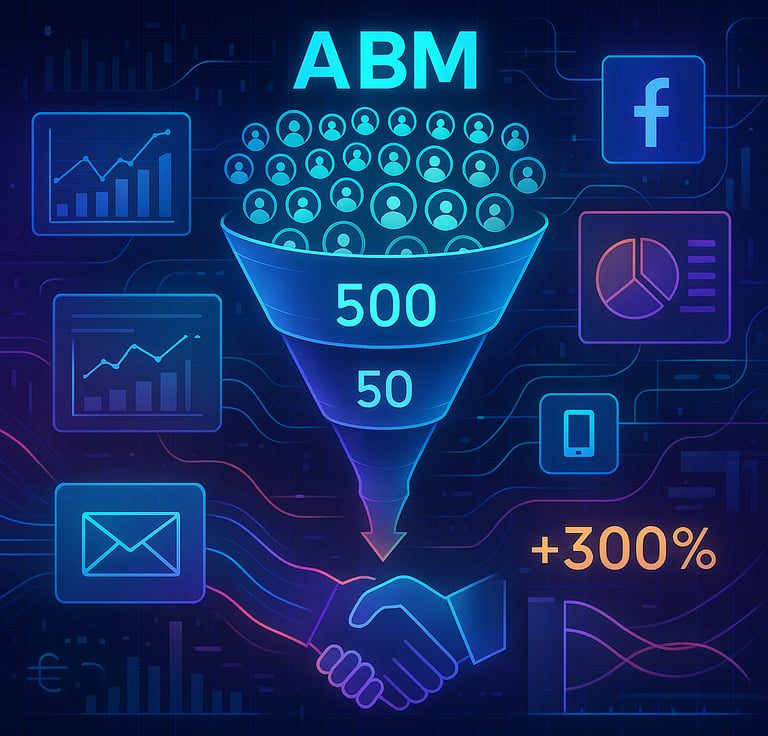

4. Video Marketing That Converts
Video continues to outperform other content formats for engagement and conversion. The most effective B2B tech companies are using video strategically throughout the buyer journey.
Short, High-Impact Videos
Attention spans are limited. Successful companies create videos that:
Quickly simplify complex information (90 seconds or less for initial engagement)
Showcase real solutions to specific problems
Feature actual customers discussing results
One of our SaaS partners replaced traditional product demos with a series of 60-second problem-solution videos tailored to different use cases. This led to a 73% increase in engagement and significantly more productive sales conversations.
If you're struggling to communicate your product's value clearly, let us help. At BriskFab, we craft complete video series that turn complex messaging into conversion-ready assets fast, clear, and built for impact. Let’s talk!
Strategic Distribution
Creating great videos isn't enough; distribution matters. The most successful approaches include:
Embedding videos on high-traffic pages with clear CTAs
Using video thumbnails in emails (which can increase click rates by 300%)
Creating custom video landing pages for specific campaigns or accounts
Video isn't just about awareness, it's a powerful tool throughout the funnel when used strategically.
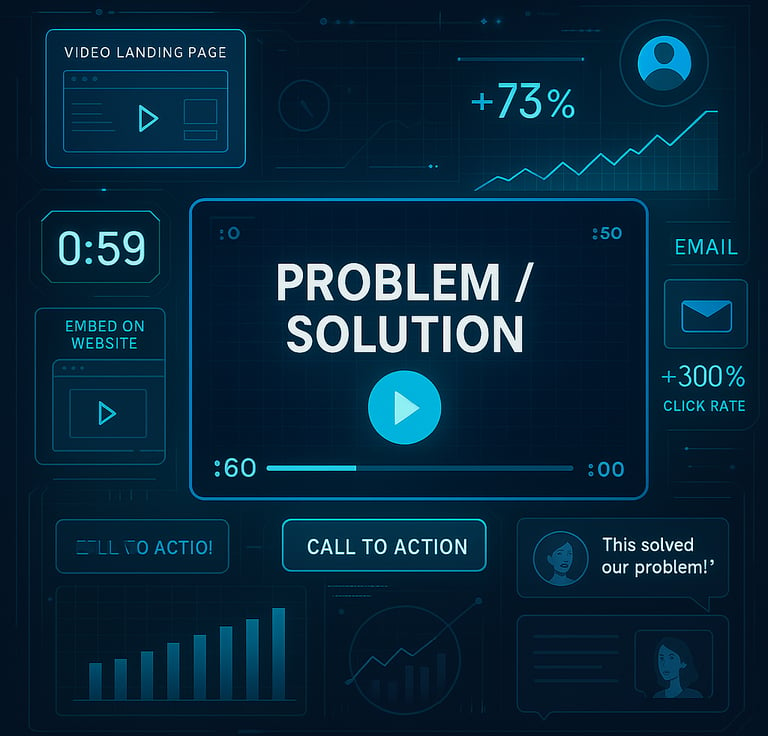

5. Email Marketing & Automation That People Actually Respond To
Email remains essential for lead nurturing, but the approach needs refinement in 2025.
Segmentation That Goes Beyond Basics
Basic demographic segmentation isn't enough anymore. Effective email strategies include:
Behavioral segmentation based on content engagement and website activity
Buying stage segmentation that delivers different content based on funnel position
Interest-based segmentation that focuses on specific pain points or solutions
The more granular your segmentation, the more relevant your messaging can be, and relevance drives response rates.
Behavior-Triggered Campaigns
The most effective email campaigns respond to prospect actions.
Companies seeing the best results use triggers like:
Website visits to specific high-intent pages
Content downloads or video views
Email engagement patterns
Sales interactions
One tech company we worked with created 15 different behavioral triggers that automatically adjusted messaging and cadence based on prospect activity. Their engagement rates increased by 47%, and their pipeline velocity improved significantly.
Content That Actually Provides Value
The bar for what constitutes "valuable" content has risen dramatically.
Generic whitepapers and eBooks aren't enough.
The content that drives engagement in 2025:
Provides actionable insights backed by original research or data
Addresses specific challenges with practical solutions
Takes a stance on industry issues rather than playing it safe
The goal is to become a trusted advisor before you become a vendor.
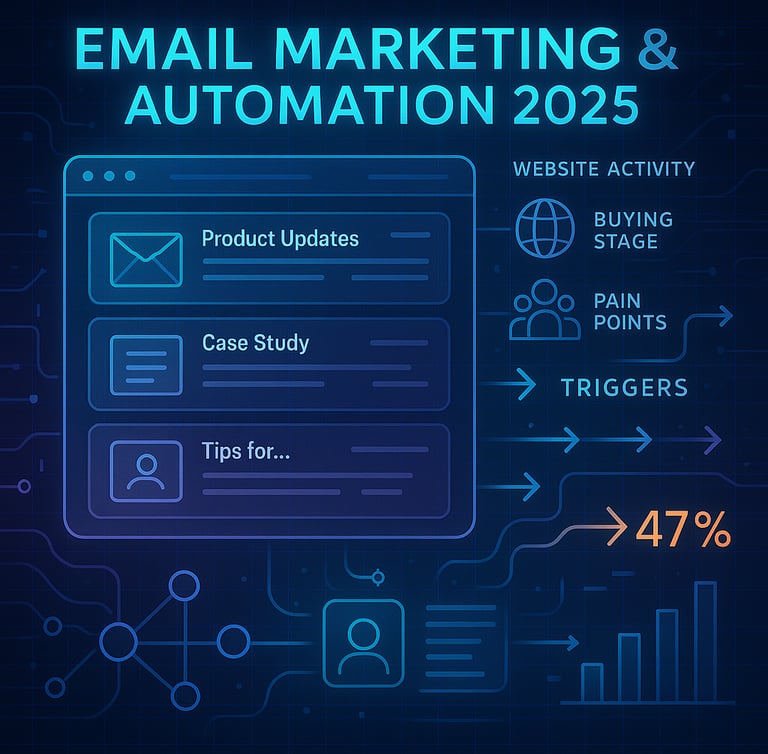

6. A/B Testing & Continuous Optimization
The B2B tech companies seeing the best lead generation results don't guess; they test methodically and optimize continuously.
Website & Landing Page Optimization
Effective testing goes beyond basic elements to examine:
Different value propositions and messaging approaches
Page structure and information hierarchy
Form fields and submission processes
Social proof placement and types
One SaaS company discovered through systematic testing that moving social proof above the fold and changing their primary value proposition increased conversions by 58%. They would never have known this without rigorous testing.
Email Campaign Testing
Email testing should examine:
Subject lines and preview text (the two biggest factors in open rates)
Email format and length
CTAs and their placement
Sending time and frequency
The companies seeing the best results test continuously, building on what works and quickly abandoning what doesn't.
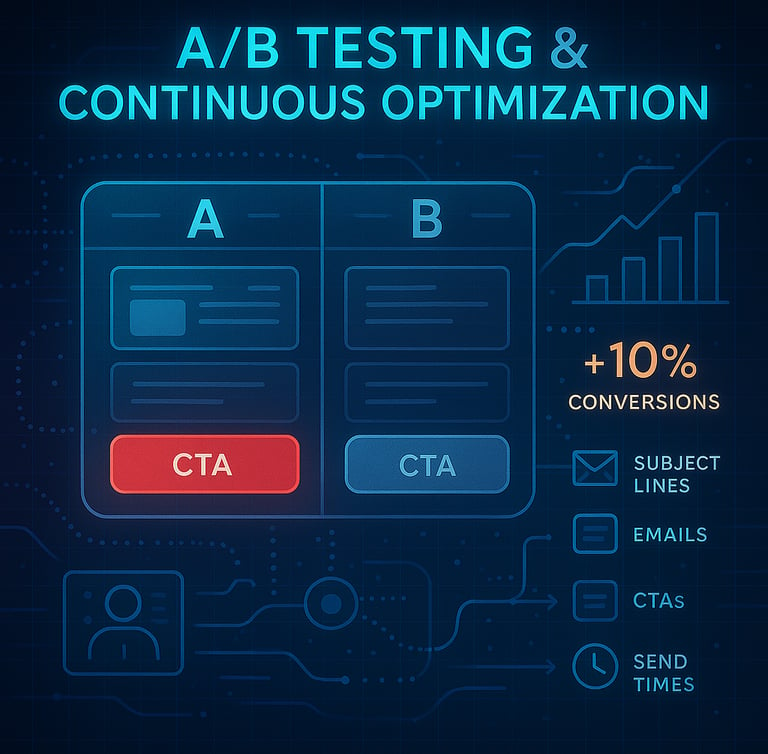

7. Free Value That Actually Converts
Offering something free remains one of the most effective lead-generation strategies when done correctly.
Genuinely Valuable Offers
The key is providing something prospects would genuinely pay for:
Tools that solve immediate problems
Assessments that deliver actionable insights
Templates that save significant time
Consultations that provide real value regardless of whether the prospect buys
One tech company replaced its gated whitepaper with a free interactive assessment tool.
Not only did their form completion rate double, but the quality of leads improved dramatically because the tool naturally qualified prospects.
Building Trust Through Generosity
When you provide genuine value upfront, you establish trust and credibility, which makes the eventual sales conversation much easier.
The most successful companies view these free offers not as lead traps but as opportunities to demonstrate expertise and build relationships.
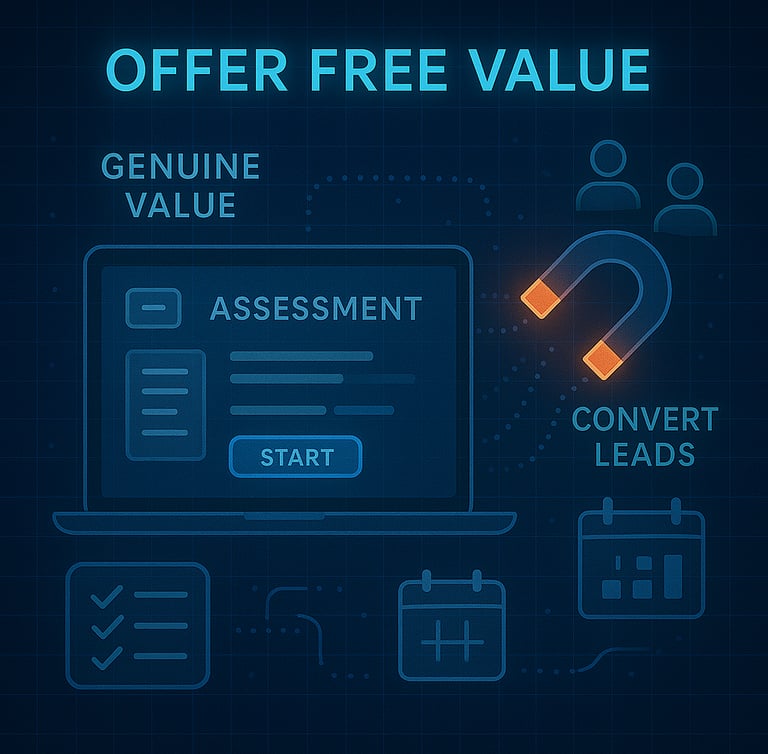

Bringing It All Together: The Integrated Approach
These seven strategies aren't isolated tactics; they work best when integrated into a cohesive approach. The most successful B2B tech companies in 2025 are creating comprehensive revenue engines that:
Align marketing and sales around a unified strategy
Use data to continually refine targeting and messaging
Deploy multiple channels in coordinated campaigns
Focus on building relationships rather than simply generating leads
The common thread across all these strategies is a focus on providing genuine value throughout the buyer journey.
Next Steps: Implementing These Strategies
Before jumping into all seven strategies, take a step back and assess your current lead generation efforts:
What’s already working?
Where are the biggest gaps?
Which strategy offers the highest potential for impact?
Start with one strategy that aligns with your growth goals. Implement it fully, track the results, and then scale to others. A focused, iterative approach will always outperform a scattered overhaul.
And remember: in B2B tech, quality > quantity. One well-qualified, highly engaged lead is far more valuable than a list of unresponsive prospects. If you need a full-fledged plan on how you can generate quality leads and increase your conversion, consult with our expert.
Need a full-fledged roadmap to attract high-quality leads and turn them into paying customers?
